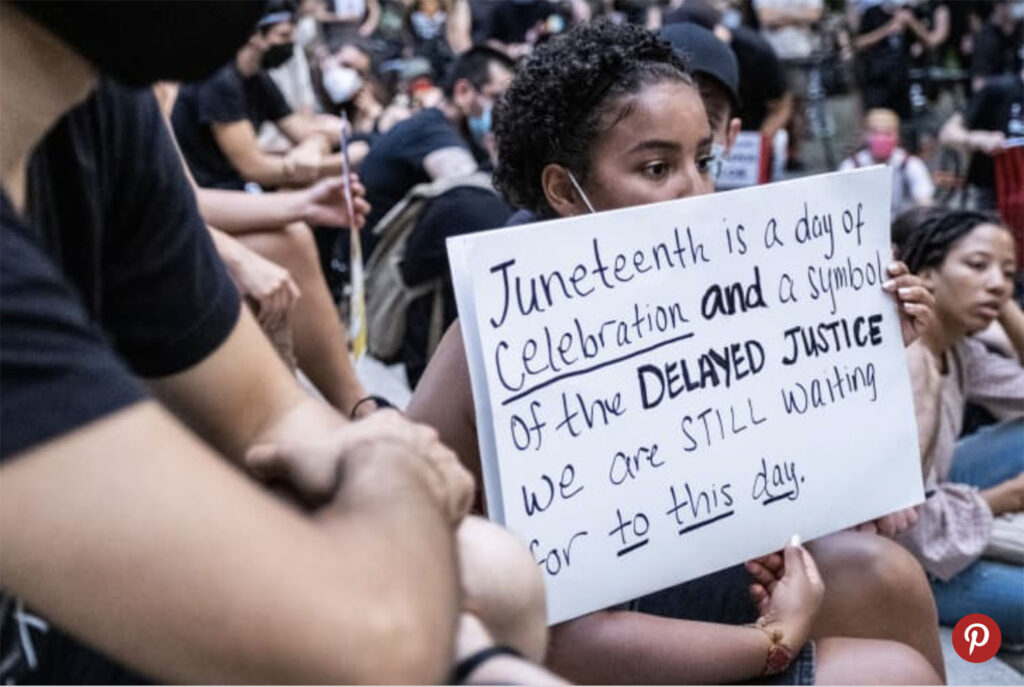By Alliance Communications Coordinator Amy Durr
Many of us who don’t identify as Black Americans know that Juneteenth is about the end of slavery, but not much more. Allyship requires a good working knowledge of both historic and culturally significant events, and the “celebration” of Juneteenth has quite a bit of nuance. LySaundra J. Campbell, a writer and editor for the National Women’s Law Center, calls Juneteenth “equal frustration and celebration,” according to Apartment Therapy.
“There’s a solemn aspect to Juneteenth. It wasn’t only about being free,” Celeste Faison, the Director of Campaigns at the NDWA, told Apartment Therapy. “When you think about the fact that we are celebrating the last people to know that slavery ended…it means that they endured slavery longer than anyone else. That’s something to be honored. A resiliency practice that we perfected during slavery is our ability to find joy, hope, and to celebrate Black life in the midst of the most dire circumstances — that’s what Juneteenth represents to me.”
Juneteenth, a holiday signed into law in 2021 by President Biden, commemorates June 19, 1865. On this day a group of enslaved people in Galveston, Texas, got the much-delayed news of their emancipation from chattel slavery — over two years after the passing of the 1863 Emancipation Proclamation. “The first Juneteenth celebration took place in 1866 in Texas with community gatherings, including sporting events, cookouts, prayers, dances, parades, and the singing of spirituals like ‘Many Thousands Gone’ and ‘Go Down Moses,’” Fabiola Cineas reported for Vox in 2020.
Over 150 years later, many modern celebrations incorporate the same traditions. The commemoration of Juneteenth typically functions as a period of rest, rejuvenation, rejoicing, and reflection amongst Black communities. “This Juneteenth, I’ll be celebrating Black Joy,” Arisha Hatch, the Vice President and Chief of Campaigns at Color Of Change, told Apartment Therapy. “After a year marked by tragedy and injustice, joy and resilience often gets lost. But at Color Of Change, we make a point to uplift joy and self-care as part of our organizing.”
“I want to celebrate my culture and also recognize we have a long way to go until Black people are truly free in this country,” LySaundra J. Campbell tells Apartment Therapy. “1865 wasn’t that long ago and since, we’ve had to succumb to other forms of enslavement and violence.” The United States did not formally abolish slavery until the ratification of the 13th Amendment on December 6, 1865 — and even that has an “indentured serviture” allowance that fuels the carceral system in the US, which disproportionately impacts Black Americans.
An important part of being a good ally is identifying resources and educating yourself without always being dependent upon marginalized groups to inform or teach you. Thanks to the internet we can learn quickly and accurately and increase our allyship with work that’s been published. Learn more about what Juneteenth means to Black Americans:
“What Juneteenth Means to 5 Black Activists, Organizers, and Writers,” Apartment Therapy, by Andie Kanaras and Ella Cerón
“Juneteenth: The History of a Holiday,” New York Times, by Derrick Bryson Taylor

